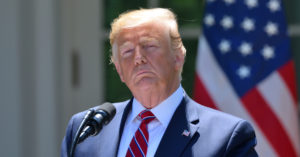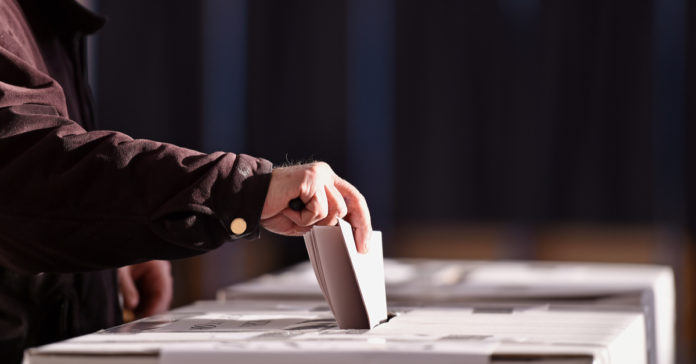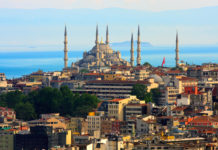Jahangir Mohammed, director of the Ayaan Institute, argues that democracy is in crisis all over the world and has descended into demagoguery and mob rule.
It seems a long time ago since George W Bush Junior declared that the United States would spread democracy to the Muslim world. In the aftermath of 9/11, Western governments declared democracy to be a universal value to be aspired to. It was presented as the most modern and advanced form of government that humanity could produce. This at the same time as democratic nations wreaked havoc and violence on the Muslim world through the War on Terror, producing an estimated one million dead and 37 million refugees around the world.
The British government even declared that vocal and active opposition to fundamental British Values, including democracy, constitutes “extremism.” But what happens when democracies become extremist?
Donald Trump when in power declared that the United States no longer wished to impose American values and democracy on the Muslim world, and it was time to fix America first. We now know that he and his followers had lost faith in their own democracy.
The United States has had more home-grown militias and acts of terrorism, than that committed by Muslims in the U.S. There are more “extremists” in the democracy-believing United States than many countries of the world.
At the end of his rule, President Trump, the most powerful political figure in the world and a flag bearer for democracy/freedom, had been silenced from speaking out on social media. He was eventually impeached for inciting an insurrection among his own people and failing to accept the results of democracy. The figurehead of Western democracy had now been recognised as an extremist inciting violence.
Democracy, demagoguery and mob rule
Subscribe to our newsletter and stay updated on the latest news and updates from around the Muslim world!
The West often portrays democracy as a modern form of governance. Yet democracy existed before the Quran was even revealed. Its origins go back to the ancient Greek Athenian City State in 507 BC. The Athenian leader Cleisthenes introduced a system of political reforms that he called demokratia, or “rule by the people” (from demos, “the people,” and kratos, or “power”). After experimenting with various styles of democracy for a couple of hundred years Greek democracy did not survive and rule by aristocracy or oligarchy replaced it.
Later, the Roman form of Republican representative democracy emerged around 133BC. By 14 AD it too had failed and was replaced by imperial hereditary rule.
The U.S. Capitol Building and the Supreme Court are built in the architecture of the Roman Pantheon. The Pantheon was a temple of worship of all Roman Gods. With the Edict of Milan in 313, Rome became a centre of Christianity and by the 7th Century Christian architecture had adopted the Pantheon into church architecture. The advent of modern democracy saw Pantheon architecture adopted by Western political institutions, such as the U.S. Capitol building. Symbolic then that this was the building which was occupied by Trump supporters. The occupation highlighted the current state of U.S. democracy.
President Trump’s period in office ended when he refused to accept the result of the democratic U.S. election. Instead, he is alleged to have incited his followers to take over the Capitol building. When his followers violently occupied the Capitol, we saw scenes on social media which highlighted the very weaknesses of democracy that the great Greek political thinkers had observed and written about. The beasts of democracy had been unmasked before our very eyes. A demagogue whipping up the mob in pursuit of political power. On the other hand, the mob were highlighting other failings of democracy – the takeover of government by powerful and vested interests against the interests of the people.

Editorial credit: Evan El-Amin
The incident reminded me of a scene from the Hollywood movie Gladiator, where senator Gracchus sums up the politics of Rome.
“I think he (Commodus) knows what Rome is. Rome is the mob. Conjure magic for them and they’ll be distracted. Take away their freedom and still they’ll roar. The beating heart of Rome is not the marble of the Senate, it’s the sand of the Colosseum. He’ll bring them death …and they will love him for it.”
Ancient Greece and Rome are to Western politicians what Mecca and Medina are to Muslims. However, the three giants of Greek political philosophy – Socrates, Plato and Aristotle – were not exactly fans of democracy. They correctly analysed the flaws of democracy which we are now witnessing.
Socrates believed that voting was a skill, and only those who were educated should be able to vote, otherwise it was like putting the untrained in charge of a ship in a storm. For Socrates only those educated about ruling should be given absolute power.
Plato in his classic, The Republic, claimed that democracy was simply the latter stages of a declining state. He believed democracies eventually become so bad that the people themselves would call for a dictator to save them from it.
He identified four stages of government ending in tyranny. Timocracy, where those with private property and military positions dominate. Oligarchy, where the ruling class acts in its own interests exploiting the poorest in society. Democracy, where citizens abuse their freedom and pursue individual and conflicting wills. These stages then lead to tyranny, where an absolute ruler suppresses the population with a despotic state. Plato believed that aristocratic rule by a select group of philosophers was the only way to prevent going through the four stages of government ending in tyranny.
Aristotle, on the other hand, objected to democracy because he believed it leads to the will of the majority overturning the rule of law. In a pure democracy the will of the majority is sovereign and they can decide to override the rule book.
Democracy in crisis
The three great Greek philosophers would be surprised at just how accurately they predicted the conditions of today’s democracies around the world.
The oldest democracies are today in crisis. On the one hand there are governments acting on behalf of vested interests. On the other, the votes of the majority are whipped up against vaguely identified and exaggerated threats. Demagogues in politics aided by the media have set electorates against those they consider outsiders and “enemies.” This has now become part and parcel of mainstream democratic politics.

Once it was Adolf Hitler who came to power through a democracy and created a tyranny which incited the German people against outsiders (Jews, Communists, and others). That fascism led to the Second World War and unimaginable suffering for the whole of humanity.
Today the target of what are becoming demo-fascist states around the world, are mainly Muslims. The masses are whipped up into fear and hatred against Muslims, by politicians and the media pandering to far-right political parties. The “democratic mob” responds, demanding ever more harsher laws, erosion of rights, punishments, or wars.
Muslims have become public enemy number one in democracies and are being accused of all kinds of conspiracies and plots. This democratic fascism started earlier than we think. Here are some examples of how democracies are living up to the expectations of the great ancient Greek political thinkers.
Serbia/Bosnia
Slobodan Milosevic came to power in Serbia in 1988 and whipped up hatred of Bosnian Muslims through public speeches and state media. As a result, his Socialist party won the democratic elections in 1990. Serbian democracy led to support for the Bosnian Serbs, and their crimes against humanity and genocide of Muslims. Eventually Milosevic was tried for war crimes in The Hague.
United States
In the U.S. Muslims have been subject to collective punishment by U.S. Presidents since 9/11 (for the crimes of a few). Two Muslim nations have been sent to the Stone Age with millions of casualties. Laws such as the Patriot Acts target Muslims. Donald Trump came clean during his election campaign, by openly stating that the problem was with Muslims. By the time he left power, even those who took up office after him, talked about the drift towards fascism in U.S. politics.
France
The French government and President Macron have perhaps gone much further than any other European democracy in demonising Muslims, by introducing laws specifically targeting a small Muslim minority (the Separatism Law). This is the first time that I can recall a minority community has been openly targeted by state laws in Europe since the Nuremberg laws targeting Jews in 1935.
Anti-Islam and Muslim hate have become so entrenched in France that recently the Interior Minister accused the main opposition far-right leader, Marine Le Pen, of being soft on Islam. Muslim organisations are now also expected to sign a “charter of Republican values” forcing them to deny a key aspect of their Islamic belief. The next French election in 2022 is likely to be fought around which of the two leaders, Macron or Le Pen, are tougher on Islam and Muslims.
Austria, Holland, Denmark, Belgium, Spain and Switzerland
In Austria, similar laws, and policies to those in France are being introduced. A 1912 law which acknowledged Islam as a religion of state is gradually being eroded.
Whilst across Europe in other democratic countries such as Holland, Denmark, Belgium, Spain far-right parties have been on the rise and forefront of politics, targeting immigrants, refugees, and Muslims.
Targeting Muslims and immigrants seems to be the key to winning elections. The most recent example of targeting Muslims in a European country is the case of a referendum on the niqab in Switzerland. The ban on religious face coverings was approved. In a country of 8.5 million around 30 Muslim women wear the niqab. Yet the Swiss have made this a major issue of state upon which to hold a referendum.
Britain
Britain has produced its own demagogue, Nigel Farage, who whipped up the nation into a frenzy against the European Union based on a fear of immigrants and talk of “take our country back.” This led to a victory in the Brexit referendum and exit from Europe, putting the country in limbo for three years, creating uncertainty and putting the UK’s union at risk.
Germany
In Germany the government has put a democratically elected party with 88 seats in Parliament under the watch of the Intelligence Services for extremism. The anti-Islam Alternative for Germany (AfD) party is now considered a threat to the state and will be the main opposition party in the next elections.
India
The world’s biggest democracy is India. Yet today the ruling BJP party is widely considered to have fascist policies. Hatred of Islam and Muslims has been at the core of its policies and rhetoric. The demagogue Modi and his politics has radicalised large sections of the majority Hindu community against Muslims and Christians. Mobs incited by India’s leaders openly lynch Muslims in the streets. Laws are changed to target Muslims.
Sri Lanka and Myanmar
Meanwhile, in democratic Sri Lanka Muslims are also being targeted. Muslim dead were forcibly cremated and denied a burial until recently. Whilst in Myanmar the democratically elected Aung San Su Kyi did nothing to prevent a genocide against Muslims by the military and Buddhist mobs for electoral gain. She even refused to recognise the genocide.
Israel
Then of course there is Israel, the so-called only democracy in the Middle East. This racial democracy has demonised, dehumanised, and humiliated its Palestinian population under its occupation for decades. It appears to be outside of all international laws and accountable to no one for its behaviour. Its successive political leaders seem to become more extreme with each election.
Survival amidst the rise of demo-fascism
If we want to stop democracies further drifting into the fascism that Plato predicted, we are going to have to come up with a better politics. Muslims are also going to have to seriously think about how to survive amid the rise of demo-fascism. Protection is unlikely to come from parliaments, politicians and laws.
A UK All Parliamentary Group on Islamophobia recently came up with a definition of Islamophobia. It lists examples of what constitutes Islamophobia but they appear to have missed the most obvious example – “politicians and political parties who target Islam and Muslims for electoral gain.”
I suggest a reading of the works of Socrates, Plato and Aristotle on the flaws of democracy may also clarify why there is an increasing hatred of Islam and Muslims in democratic countries presently.
This article first appeared on the Ayaan Institute website.






















